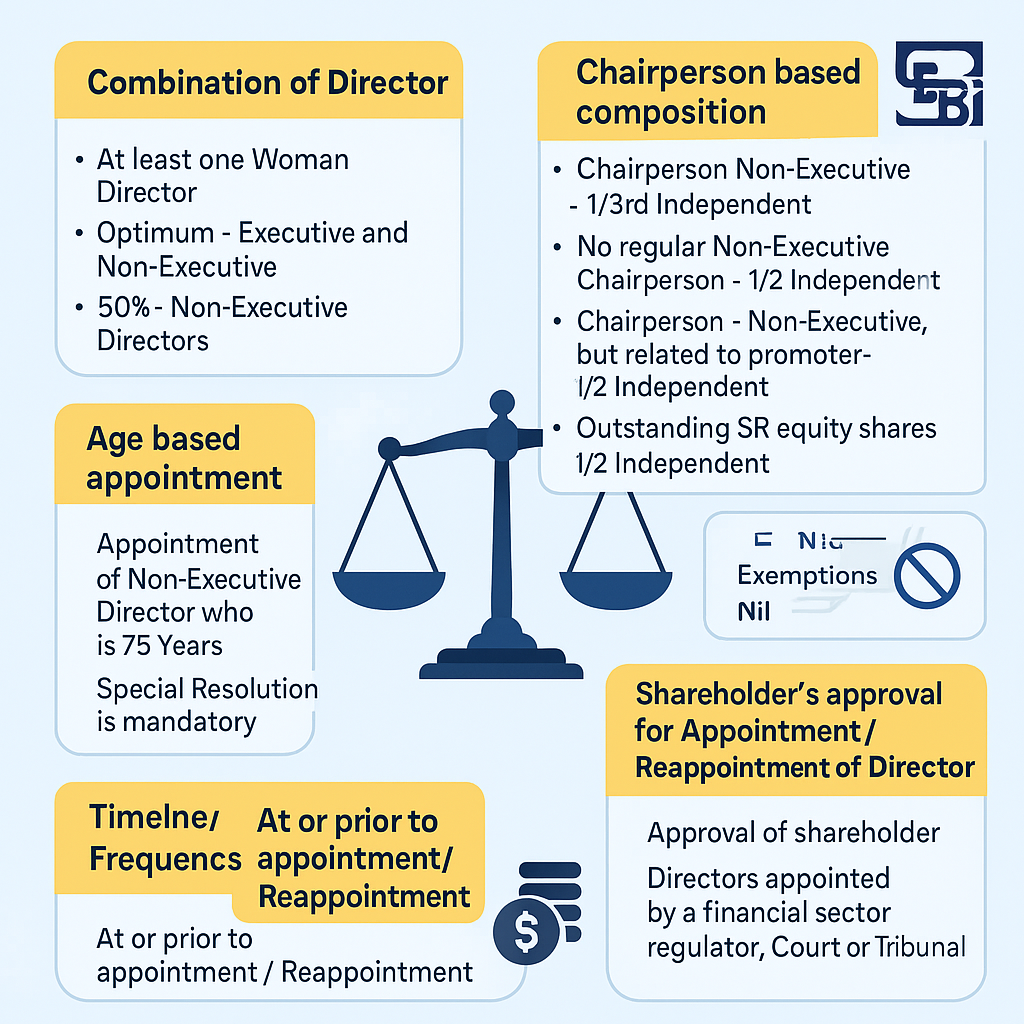View News
Regulation-of-SEBI-Listing-Obligations-and-Disclosure-Requirements-Regulations-2015-A-Scoop-of-Compliance-Delight

Regulation 17 of SEBI (Listing Obligations and Disclosure Requirements) Regulations, 2015: A Scoop of Compliance Delight
Introduction
Regulation 17 of SEBI (Listing Obligations and Disclosure Requirements) Regulations, 2015 (LODR), stands as one of the most pivotal regulatory provisions governing corporate governance in India. This regulation lays the foundation for the composition, functioning, and responsibilities of the Board of Directors in listed companies. Given its significance, the regulation has undergone multiple amendments to ensure transparency, efficiency, and enhanced governance.
This article presents a simplified yet comprehensive breakdown of Regulation 17, making it easier for compliance professionals to grasp and implement its provisions.
Key Provisions Under Regulation 17
The following table provides a detailed view of various sub-regulations of Regulation 17, their key provisions, compliance timelines, exemptions (if any), and applicability based on market capitalization:
Composition and Appointment of Directors
| Sub-Regulation | Heading | Key Provision | Timeline/Frequency | Exemptions, if any | Specific for Market Capitalisation |
|---|---|---|---|---|---|
| 17(1)(a) | Combination of Directors | a) At least one woman director b) Optimum mix of Executive & Non-Executive Directors c) 50% should be Non-Executive Directors |
At all times (Vacancy to be filled within 3 months) | Nil | Top 1000 – At least one Woman Independent Director |
| 17(1)(b) to 17(1)(d) | Chairperson-Based Composition | a) Non-Executive Chairperson - 1/3rd Independent Directors b) No regular Non-Executive Chairperson - ½ Independent Directors c) Non-Executive Chairperson but related to promoter - ½ Independent Directors d) Outstanding SR equity shares - ½ Independent Directors |
At all times (Vacancy to be filled within 3 months) | Nil | Top 2000 – At least six Directors |
| 17(1A) | Age-Based Appointment | Appointment of Non-Executive Director who is 75 years or older requires a Special Resolution | Special Resolution at or prior to appointment/reappointment | Nil | Nil |
| 17(1C)(a) | Shareholder’s Approval for Director Appointment/Reappointment | Approval of shareholders required | General: Within 3 months or next General Meeting (whichever is earlier) Public sector: Immediate AGM after appointment Time for government approval excluded |
Directors appointed by a financial sector regulator, Court, or Tribunal are exempted | Nil |
| 17(1C)(b) | Directors Rejected by Shareholders | A director earlier rejected by shareholders can be appointed only after prior shareholder approval | NA | Nil | Nil |
| 17(1D) | Tenure of Director | Maximum tenure: 5 years per appointment/reappointment | 5 years from appointment/reappointment | Exempted for: 1. Whole-Time Director 2. Managing Director 3. Independent Director 4. Directors liable to retire by rotation 5. Director appointed by Court/Tribunal 6. Nominee Director of Financial Sector Regulator 7. Directors nominated by SEBI-registered Debenture Trustee |
Nil |
| 17(1E) | Vacancy | a) General Vacancy - To be filled by Board within 3 months b) Expiration of Tenure - To be filled by Board immediately |
At all times | If compliance requirements are met without filling the vacancy | Nil |
Board Meetings and Compliance
| Sub-Regulation | Heading | Key Provision | Timeline/Frequency | Exemptions, if any |
|---|---|---|---|---|
| 17(2) & 17(2A) | Frequency of Board Meetings | Board must meet at least 4 times in a financial year with a maximum gap of 120 days between two meetings | At least 4 meetings per year | Nil |
| 17(3) | Compliance Review | Board must periodically review compliance reports and take corrective actions | Periodically | Nil |
| 17(4) | Succession Plan | Board must ensure a succession plan for Directors & Senior Management | Ongoing | Nil |
| 17(5) | Code of Conduct | Board must lay down a Code of Conduct for Directors & Senior Management | Ongoing | Nil |
| 17(6) | Fees/Compensation/ESOP | a) Non-Executive Directors’ remuneration requires shareholder approval b) If remuneration of a single NED exceeds 50% of total NED remuneration – Special Resolution required c) Independent Directors are not entitled to stock options |
As per approvals | Nil |
| 17(10) | Performance Evaluation | Board to evaluate the performance of Independent Directors | Ongoing | Nil |
Conclusion
Regulation 17 of SEBI (LODR) Regulations, 2015, serves as the backbone of corporate governance in listed entities. It ensures that boards maintain a balanced composition, follow transparent processes, and uphold the highest standards of accountability. While the provisions may seem exhaustive, their implementation fosters investor confidence, enhances decision-making, and ultimately drives sustainable business growth.
For compliance professionals, staying updated with these provisions is essential for maintaining regulatory adherence and avoiding penalties. The structured approach in this article provides a ready reference to effectively manage compliance under Regulation 17.
About the Author: CS J Swarnalakshmi is a seasoned professional in corporate governance, specializing in SEBI regulations and LODR compliance. With extensive experience in advisory and implementation, she is dedicated to simplifying complex regulations for the corporate world.
Disclaimer: This article is for informational purposes only and should not be construed as legal advice. Readers are advised to consult professional experts for specific compliance needs.

